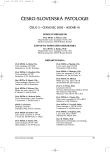Emphysematous Cystitis due to Clostridium perfringens - a Localised Infection in a Man with Generalized Melanoma
Cystitis emphysematosa, způsobená Clostridium perfringens – lokální infekce u nemocného s generalizovaným melanomem
Emfyzematózní cystitida byla zjištěna při pitvě 47letého muže s generalizovaným melanomem. Bakteriologické vyšetření potvrdilo přítomnost Escherichia coli, Klebsiella sp. a Clostridium perfringens typ A, toxický kmen. Histologický nález je charakterizovaný cystickým rozšířením lymfatických cév jak ve sliznici, tak ve svalovině měchýře.Ve výstelce cyst byly místy i vícejaderné makrofágy a v jejich průsvitu jen ojedinělé grampozitivní tyče. Ve slizničním i podslizničním vazivu pak byly znaky chronického zánětu, místy i drobné krvácení.
Soudíme, že tvorbu plynu způsobilo Clostridium perfringens. Předpokládáme, že infekce se rozvinula v souvislosti s opakovaným zavedením permanentního katétru do močového měchýře u pacienta s druhotným útlumem imunity.
Emfyzematózní cystitida v našem případě byla lokální infekcí, bez průvodných klinických nebo morfologických známek sepse.
Klíčová slova:
emfyzematózní cystitis – Clostridium perfringens – močový měchýř – infekce
Authors:
L. Peychl 1; J. Pomykal 2; O. Hes 3
Authors‘ workplace:
Oddělení patologie Nemocnice, Kolín
1; Oddělení klinické mikrobiologie Nemocnice, Kolín
2; Šiklův ústav patologie LF UK, Plzeň
3
Published in:
Čes.-slov. Patol., 41, 2005, No. 3, p. 107-110
Category:
Original Article
Overview
Emphysematous cystitis was found at autopsy of a 47-year-old man suffering from generalised malignant melanoma.
Bacteriological cultures from the urinary bladder showed Escherichia coli, Klebsiella sp. and Clostridium perfringens type A, toxic strain.
The histological examination revealed cystic dilatation of lymphatic vessels both in bladder mucosa and muscularis propria. There were multinucleated macrophages in the lining of some of these cystic spaces and a few Gram-positive rods inside their lumina. In the mucosal and submucosal connective tissue there were signs of chronic inflammation and, focally, small haemorrhages.
We suppose that the gas production was due to the presence of Clostridium perfringens and believe that the infection of the urinary bladder occurred in relation to the repeated insertion of the catheter into the bladder of a patient with secondary immunosuppression.
Emphysematous cystitis was, in our case, a localised clostridial infection without clinical and morphological signs of generalised septicaemia.
Key words:
emphysematous cystitis – Clostridium perfringens – urinary bladder – infection
Labels
Anatomical pathology Forensic medical examiner ToxicologyArticle was published in
Czecho-Slovak Pathology

2005 Issue 3
-
All articles in this issue
- Immunohistochemical Study of the Apoptotic and Proliferative Mechanisms in the Intestinal Mucosa During Coeliac Disease
- Mammary gland development and cancer
- Shadow Cell Differentiation in Testicular Teratomas. A Report of Two Cases
- Emphysematous Cystitis due to Clostridium perfringens - a Localised Infection in a Man with Generalized Melanoma
- Adenomatoid Tumor of the Right Adrenal Gland: A Case Report
- Marking Excision Margins of Surgical Specimens by Silver Impregnation
- Czecho-Slovak Pathology
- Journal archive
- Current issue
- About the journal
Most read in this issue
- Mammary gland development and cancer
- Emphysematous Cystitis due to Clostridium perfringens - a Localised Infection in a Man with Generalized Melanoma
- Adenomatoid Tumor of the Right Adrenal Gland: A Case Report
- Immunohistochemical Study of the Apoptotic and Proliferative Mechanisms in the Intestinal Mucosa During Coeliac Disease
